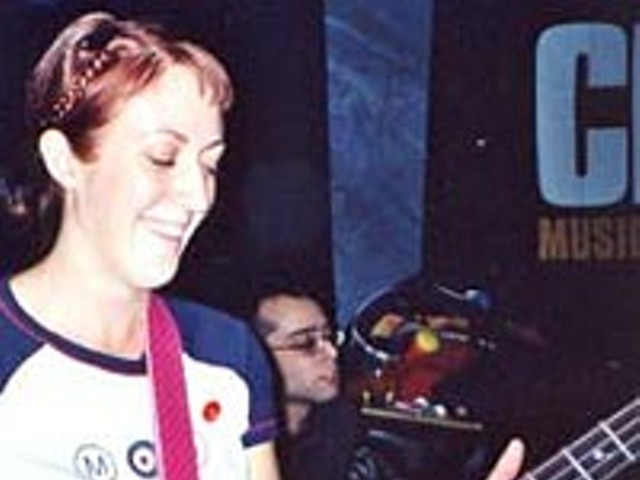Cue up the music, kids, and hit the lights. It seems Omaha’s hyperintelligent, music biz-loathing Tim Kashner has returned with another twisted tale of a lost misanthropic soul, a tale that sees him negotiating the emotional chasm between the promise of love and our collective foibles and frailties. What’s more, his parents approve, though he’s hardly regarded as a conquering hero when he’s home.
Like Charlie Kaufman in Adaptation, Kashner’s written himself into his music. On his latest release with his band Cursive, The Ugly Organ, he makes his emotionally scarred and critically self-conscious character the main player in a series of vignettes constructed within a theatrical conceit. (The lyrics, for example, include stage directions.)
The record continues the loose narrative arc begun on Cursive’s breakthrough album, 2000’s Domestica, and followed in 2002 with his solo release (under the Good Life moniker), Black Out, tracing his journey from courtship and marriage to divorce and dissolution, and now, through the emotional wreckage left in its wake.
Kashner is on the phone from the back of his van, heading into Atlanta. He’s with his compadres in the Good Life on the last stretch of shows before he starts the Cursive tour.
He laughs when it’s suggested that the way he’s used his personal life for lyrical grist and peppered his albums with self-referential deconstructions of his mini-stardom threaten to make him an indie-rock Slim Shady.
“I think it’s great what he writes about. I can’t believe someone is being that self-analytical in Top 40 pop music. Most people don’t even recognize it. There’s so much more going on with him,” Kashner suggests. “Bono tried to do it and he just failed miserably. Nobody really understood it because it seemed too much like he was trying to be, ‘Oh, look at my silly character, aren’t I silly? I’m a silly rock star.’ But he seemed way too engrossed in himself.”
Kashner himself has been accused of the same sort of self-absorption. He mocks it on his latest album, singing, “I’ve been making money off my indifference … the blood on my hands after I wrote this album, play it off as stigmata for crossover fans,” on “Some Red Handed Slight of Hand.”
But while he plays his penchant for self-revelation for laughs, Kashner admits he knows no better way to create.
“The best work is always your most personal work. That’s what you can describe and know the best, and what you’re going through is universal with what everyone else is going through in one facet or another. So the closer that you write personally, the more universal it probably is,” Kashner explains. “Then they’ll be more honest with themselves as a listener.”
Picking up after the self-descriptive emotional nadir of Black Out’s “Some Bullshit Escape” and “The New Denial,” The Ugly Organ focuses on Kashner’s attempts at re-creating an identity outside of his sense of personal injury and loss of faith. In doing so, he acknowledges his audience’s appetite for misery and his willingness to provide it, as well as its impact on those in his life. On “Art is Hard” he sings, “the crowds are catching on/to the self-inflicted song … the art of acting weak/fall in love to fail/to boost your CD sales” The girl in “Butcher The Song” complains “each album, I’ll get shit on more/‘Who’s Tim’s latest whore.’”
Musically, The Ugly Organ hits a striking new chord thanks to the addition of cellist Gretta Cohn. Cohn joined the band in time for its Burst & Bloom EP, but the songs were already arranged and she simply played over them. On this new album, Cursive takes full advantage of Cohn; she brings additional tension to the already churning, Fugazi-inspired staccato guitar crashes.
Indeed, often as Cursive’s guitars crash with modulated fury, Cohn’s cello offers musical counterpoint, providing a legato rush against their spastic blasts. Whereas before compositions were ruled by the tempered syncopation of the guitars, the cello now helps forge a powerful, visceral low end with enhanced ability to carry the melodic line. Kashner welcomes Cohn’s addition to the band not only for her talent, but because he believes she was the perfect prescription for a problem in waiting.
“It was just what we needed and especially what I needed. After doing those first three Cursive albums, I was tired. Not necessarily of doing Cursive, but I was tired of doing it in the format that we were doing it. So it seemed a viable answer that if you brought in a different timbre it could open the doors to different ideas, different styles, and different sounds. To kind of re-create it for myself and make it interesting again,” Kashner says.
Back at home you’d think things would be going swimmingly enough for Kashner, given the success and acclaim heaped on his own bands and fellow Omaha residents the Faint, Conor Oberst’s Bright Eyes and Saddle Creek records. Hardly. Far from being grateful for the national attention, many locals and friends in his hometown are resentful and jealous.
“Omaha is a weird place, and it makes you want to go to the bars a little less, because these people that you are becoming out of touch with because you’re working so hard so often, they think that you think you’re too big for your britches, and it’s just all bullshit,” Kashner says. “Then there’s the other factor, I call it ‘the Conor’ because for many years Conor has had so many haters who despise him. I always say to him, ‘The more people that hate you, the better you’re doing.’”
However, Kashner does see an advantage to all the hype that’s surrounded Saddle Creek and his longtime pal Conor. It’s shielded him a bit from the spotlight’s glare, and for that he’s thankful.
“One big benefit for myself as a songwriter is that as far as nationwide, I’ve become kind of the underdog, and I think that’s a great place to be — because nobody really hates underdogs. I’m the one that everyone wants to raise up on their shoulders,” says Kashner. “I don’t have to carry the torch Conor carries, that’s for sure.”
On the subject of celebrity, Kashner complains that it’s unfair the way we tar and feather artists with the “rock star” tag, accusing musicians of an egomania that we half-demand of them in our desire for larger-than-life heroes.
“Because of the ‘rock star,’ it’s really a backdrop for what you do. My parents are really proud of what I’m doing now, but for the longest time my mom was ‘Oh, you’re a writer, but you should write a book.’ Because that’s so much more prestigious, and this could be just as prestigious but it’s not, because of that backdrop to it,” says Kashner. “I think it [rock star] is a derogatory term, and it totally devalues what we’re trying to do as songwriters.”
Because, while Omaha’s far away from 8 Mile, he’s still trying to keep it real.
See Cursive with No Knife and Minus the Bear at the Majestic Theatre (4120 Woodward, Detroit) on Friday, March 21. Call 313-833-9700 for more information.
Chris Parker writes about music for Metro Times. E-mail [email protected]




